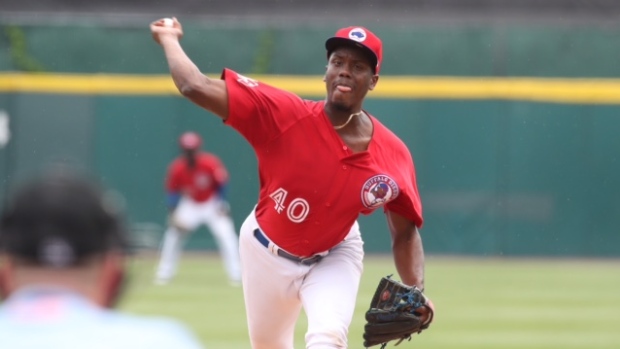Sep 1, 2017
Remarkable run lands Ramirez in Toronto
The newest member of the Blue Jays bullpen is a converted outfielder who didn’t give up a single earned run in 37.2 innings of work in the minors this season, Scott Mitchell writes.

BUFFALO — Carlos Ramirez laughs at the question first.
Then a puzzled look appears.
Do you remember the last time you gave up a run?
“Let me see … one unearned run was in Double-A?" Ramirez wonders aloud, looking around the Buffalo Bisons’ clubhouse for an answer. “I was injured for two months, so after I came back. I don’t know. Last month or the month before? I don’t know.”
He can’t remember.
The answer is July 25 in New Hampshire, about two weeks before he was promoted to Triple-A Buffalo.
It was unearned. Same as the only other run he's allowed this season, back on April 18.
Now, he’s on his way to the big leagues to join the Toronto Blue Jays bullpen, and his minor-league ERA is still 0.00.
In 37.2 innings this season, the 26-year-old right-hander hasn’t given up an earned run. Not one.
No wonder he has trouble answering the question.
Ask the Dominican-born, Santo Domingo product about the day the Blue Jays told him they wanted to convert him from an outfielder into a pitcher, and the tone changes.
“I remember that day, for sure,” Ramirez says. “When they first told me that, I was in shock. Like, ‘What?’ I went back to the hotel and I started crying. I didn’t want to pitch. I said I won’t pitch. And people say, ‘You’ve got a future.’ I said, ‘No, I don’t think I have a future.’ I didn’t want to do it.”
Ramirez’s 2013 season with the Low-A Lansing Lugnuts was his finest as a hitter. That’s not saying much.
While he did hit seven home runs and steal 14 bases, Ramirez also slashed just .228/.297/.375, his fifth straight season in the minors with an OPS under .700.
After opening the 2014 campaign with a .176 average in 28 games back in Low-A, the Blue Jays had seen enough.
Ramirez remembers talking to former Blue Jays minor league pitching co-ordinator Dane Johnson, now the bullpen coach, when he was sent to extended spring training in Dunedin to begin his transition to the mound.
“When I first got on the mound, I was angry because I didn’t want to do it,” Ramirez says. “I remember that moment. I was just throwing the ball.
“I said straight to him three times, ‘I won’t do it.’ He said, ‘Try.’ I said, ‘I won’t do it. I want to hit.’”
Eventually, Ramirez took to the process.
In 17 games for Bluefield that year, he posted a 2.63 ERA, but the peripherals weren’t pretty as he struck out just 6.3 hitters per nine innings while walking five every nine.
His ERA ballooned to 4.73 the following year, but the peripherals improved and the transition seemed to be coming along.
More improvement came in 2016, and he saved nine games for High-A Dunedin and registered a 2.20 ERA, even if he was struggling with command and still issuing far too many free passes.
That’s all changed in 2017.
Ramirez has taken off, limiting the walks to a measly 2.4 BB/9 and striking out 10.8 K/9 to go along with his unblemished ERA.
The gangly 6-foot-5, 205-pounder credits dropping his arm slot down to more of a 3/4 motion for “more movement and more consistency” on both his fastball and a wipeout slider that Bisons manager Bobby Meacham has watched opposing hitters flail at.
“I've never really seen hitters react like this,” Meacham says. “Every day that he pitches, you see that same look on their face, like, ‘What was that?’ I haven’t seen that all year. That’s pretty fun to watch. It’s doing something different than everybody’s used to seeing. Right-handers just run out of bat and all of a sudden they can’t catch up with it outside.”
By today’s standards, his fastball isn’t overpowering, sitting in the mid-90s, but the two-pitch combo is more than enough when the slider is on.
Now he gets to test it against big leaguers, something he never thought would be possible just three years ago.
“I never thought in my life I would get to this point pitching-wise,” Ramirez says with a huge smile. “It’s an amazing feeling.”
Meacham noted you learn a lot about pitchers when they struggle and have to right the ship.
Ramirez hasn’t needed to do that this year. Not once.
He’ll encounter struggles in the majors without a doubt, and he’ll have to adjust, just as he did when he was initially asked to take his career to the mound.
“I’ve seen guys make transitions and do pretty well over the years, but I’ve seen a lot of guys do it well and a lot of guys that do it well for a while,” Meacham says. “We’ll see which one he is. Is it going to be a Troy Percival-type thing? Or I can name a couple guys you’ve never heard of.”

